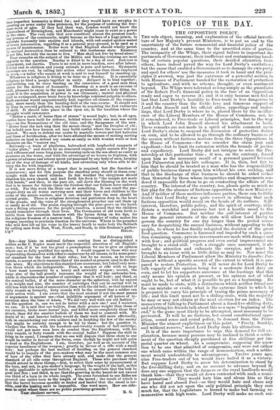THE NATION'S DEFENSIVE FORCE.
16th February 1852.
Sin—You inserted some weeks back a letter of mine on the subject of making the soldiers of our standing army citizens as well as soldiers. In that letter I certainly did not contemplate a large standing army, but only just such numbers as might form a pattern corps for a general body of mih- tia, serving as instructors to the community. Of the disadvantages of a large national army France is giving us abundant proof ; and it seems tolerably certain that if the material means can be created and preserved for the maintenance of that army, M. Bonaparte may enact during his life- tune the rele of the Jesuit Francis, with France for his Paraguay. Edu- cation consists in reading, talking, and travelling ; and if these three processes be stopped, save for the select few, it is quite clear that in thirty years Prussia may be drilled town to the condition of the middle ages. The people of each city and district become isolated bodies, and may be taught to hate each other, as of old, leaving the interested ruler to coerce them in detail for his own purposes. What has been done in France, and which will be permanent if the army wills it under the pampering of its master-slaves may be done in England also. There are English-born men so constituted that they believe arbitrary power to be a great good--eertainly to them- selves—and the only means of insuring the largest measure of happiness that imperfect humanity is fitted for ; and they would have no scruples in mating an army under false pretencea, for the purpose of undoing the free- dom-work of ages. If they had their way, London would not know the *hereabout of Birmingham and Manchester might cease to exist as a power in the state. The very rails that now constitute almost the greatest teach- ing process of the community, might become as the bars of a huge prison, to separate humanity into squares and islands, with red-coated spiders seated at every intersection, regarding it as a general prey-ground, to be used as a means of maintenance. Better were it that England should wholly perish by mutual destruction than be reduced to this loathsome state. Existence is not. life, but only the means to live. "Man shall not live by bread alone." Your remarks on the subject of the Militia and Sunday-training are most apposite to the question. Sunday is fitted to be a day of rest. And rest is enjoyment, not inertia. There is no rest in mere inaction, save after labour. Forced rest to children and young animals is pain and torture. Gymnastic exercises are rest, by calling into action other muscles than those employed in work,—a tailor who squats at work is said to rest himself by standing up. Whatever is religious is fitting to be done on a Sunday. It is essentially religious to bind a people together in unity. Religari is to bind together; and nothing can be more binding on the conscience of a good man than union for the defence of humanity. Shooting at a mark is an exercise of skill, pleasant to enjoy in the open air as a gymnastic, and a holy thing, be- cause it is the acquisition of power to use virtuously; mental and phyaical skill to extinguish mere brute force by knowledge rendered palpable Mothers. Such exercise would unquestionably knit together ail classes of the commu- nity, more surely than the hunting-field or the race-course. It should not be done in covered galleries, any longer than in acquiring the first rudiments of skill. It should take place in the open air, in the localities where the struggle would commence.
"Better a castle of bones than of stones" is sound logic; but, in all ages, castles have been built for defence behind whose walls one man was worth ten,—as the Numantians of the old time, and the Saragosans of the new. "Better hear the lark sing than the mouse cheep," said the Douglas of old ; but behold now how human art may build castles where the mouse will not burrow. We seek to defend our coasts by marten° towers and fort batteries and lines of fortification, after we have attained the means of making moving batteries on land to defend our coasts as easily as with wooden walls or iron steamers on the "narrow sea."
Seriously—a train of platforms, bulwarked with loophooled ramparts of "boiler plate," and drawn by an armoured engine, might contain five hun- dred riflemen and some long guns, traversing rails on the sea-shore as easily as steamers on the water, and with the advantage of no horses to frighten with a power of advance and retreat never yet possessed by any body of men, keeping out of the way of damage of all kinds, and advancing only when able to de- stroy the foe with impunity. It is not mere firing at a target that is required, but the function of manoeuvres; and for this purpose the standing army should at times com- mingle with the armed citizens. In fair weather the clergyman should abandon his town church and lead forth his flock to "the temple not made
with hands," and then, in the pure air, call down the blessing on the work that is to insure for future times the freedom that our fathers have endowed us with. For this work the State can do something. It can remit the pas- senger-duty on all trains carrying men and their wives and children to the scene of the mimic warfare, and it can stipulate that the men should be earned gratis. There is religious devotion and patriotism deep in the heart of the people, and the voice of the stronghearted preacher can call them up as easily as of old. The psalm ringing through the pine-grove on the heath were a fitting utterance for the people's resolves, a sound that the children should remember through their lives. The Covenanter of old went forth to battle from his mountain fastness with the hymn dying an his lips, for the religious freedom of a narrow land. The Covenanter of today makes his weapon unerring to proclaim freedom for the universe. Where is the preacher who will first lift up his voiee in the breezy heath to make holy the Sabbath by calling men from East, West, North, and South, to this freeman's gather-
Heux.



























 Previous page
Previous page